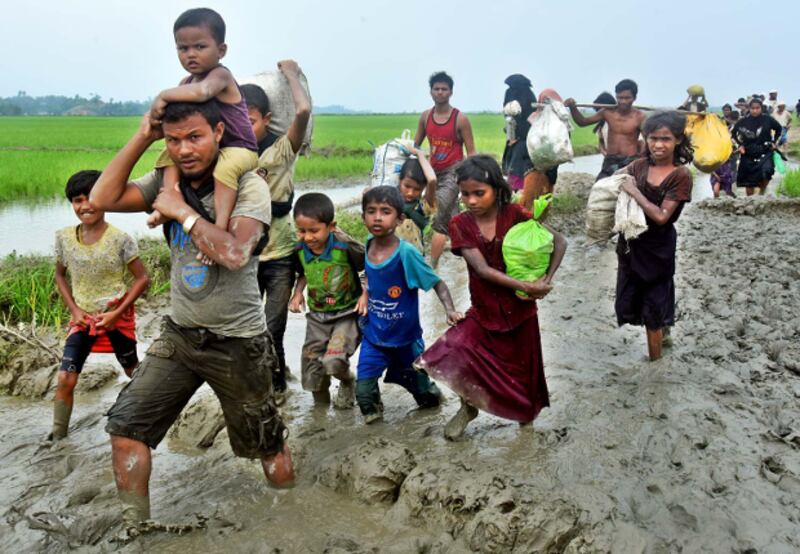Bangladesh wants the world to help it resolve a burdensome new Rohingya Muslim humanitarian crisis, Prime Minister Sheikh Hasina told Turkey’s visiting first lady and foreign minister on Thursday after they toured refugee camps in the country’s southeast.
Hasina met with Turkish first lady Emine Erdogan and Foreign Minister Mevlut Cavusoglu in Dhaka, while U.N. officials updated estimates for the number of Rohingya refugees spilling into Bangladesh over the past two weeks to 164,000, as they have fled an outbreak of violence in the neighboring Myanmar state of Rakhine.
“The international community must take the responsibility,” Hasina told her Turkish visitors, adding that Dhaka would accept new Rohingya refugee arrivals on “humanitarian grounds.”
The flood of new refugees since Aug. 25 – combined with 87,000 who arrived following another cycle of violence in Rakhine in October 2016, according to the United Nations – brings the total number of recent refugee arrivals to around a quarter-million. This influx adds to more than 400,000 Rohingya refugees who were already sheltering in camps and settlements across southeastern Bangladesh.
In the past few days, U.N. and Bangladeshi officials warned that the existing camps were overflowing with refugees and that the crisis was straining humanitarian resources.
The Bangladeshi prime minister also told the Turkish visitors about how the exodus from Myanmar was a “big burden for us,” said her spokesman, Ihsanul Karim.
“Turkey is trying to build up a global opinion against the persecution, as the whole world has the responsibility to resolve the crisis,” Karim quoted Erdogan as telling Hasina during their meeting.
Hasina said her government had taken initiatives to identify incoming Rohingya and others to ensure that no “terrorists” were posing as refugees crossing the border, according to Karim.
“We will not allow our land to be used by any insurgent [group] for terrorist activities against any country,” Hasina said.
The latest cycle of violence flared in Rakhine on Aug. 24, when members of an insurgent group calling itself the Arakan Rohingya Salvation Army (ARSA) carried out multiple attacks on Myanmar police posts in Rakhine.
Since reports of mass atrocities against Rohingya civilians and burnings of Rohingya villages emerged in Rakhine state, starting in late August, at least 85 people have died along the Myanmar border as they have tried to enter Bangladesh, according to Bangladeshi authorities.
Most of the victims have drowned while trying to cross the Naf River that separates the two countries. The number includes five Rohingya villagers from Rakhine whose bodies were found on a river bank on the Bangladeshi side, after they were allegedly shot dead by Myanmar security forces, a police officer-in-charge in Ukhia, Bangladesh, told BenarNews on Wednesday, citing eyewitness accounts from other refugees.
On Thursday, the bodies of the five villagers were buried, according to Bangladeshi authorities who said that the bodies of 15 people who drowned while trying to cross the river were pulled out of the Naf.
“People have walked for up to six days before crossing into Bangladesh and are suffering hunger and exhaustion, and are in urgent need of food, water, shelter and health services,” U.N. Bangladesh Resident Coordinator Robert Watkins said in a statement issued on Thursday.
Turkish dignitaries visit camps
During her trip to the southeast earlier in the day, Erdogan was photographed shedding tears while talking to elderly Rohingya women at the Kutupalong camp, one of the two U.N.-run refugee camps in Cox’s Bazar district. The two camps had a combined population of about 30,000 people before the new influx of refugees.
Cavusoglu, the Turkish foreign minister, posted photographs from the camps on Twitter.
“#Turkey will never leave #Rohingya Muslims alone. International community should also provide the necessary support without further delay,” he said in one tweet.
A day earlier, Turkish President Tayyip Erdogan said that Turkey would send 10,000 tons of humanitarian aid to help Rohingya who had fled violence in Myanmar, according to reports.
He earlier had accused Myanmar’s government of carrying out “genocide” against the Rohingya, a Muslim minority whose members are not recognized as citizens in Myanmar, where the Buddhist majority refers to them pejoratively as “Bengalis.”

Rohingya refugees enter Bangladesh at Khanjoroara in Teknaf, Cox's Bazar, Sept. 7, 2017. [Abdur Rahman/BenarNews]
